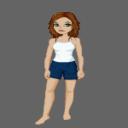Yahoo Answers is shutting down on May 4th, 2021 (Eastern Time) and beginning April 20th, 2021 (Eastern Time) the Yahoo Answers website will be in read-only mode. There will be no changes to other Yahoo properties or services, or your Yahoo account. You can find more information about the Yahoo Answers shutdown and how to download your data on this help page.
Trending News
How do you get protein if you are vegetarian? What happens if you do not get enough?
I am becoming vegetarian slowly and my mom has noticed and has been non-stop nagging me about how it is not good, and I will not get enough protein and I will get sick. My mom is in the medical business, so I trust what she said. So what are the main sources of proteins for vegetarians, and what is the worst that could happen if you do not get enough protein over time?
19 Answers
- Anonymous1 decade agoFavorite Answer
You get protein from eating food. You would have to starve yourself to not get enough. This website, run by the Mayo Clinic and has a copy of the vegetarian food pyramid on it. Use it when planing your meals.
Vegetarian diet: How to get the best nutrition
http://www.mayoclinic.com/health/vegetarian-diet/H...
The Protein Myth
Physicians Committee for Responsible Medicine
- Anonymous1 decade ago
Hi. It's unlikely that you'll get a protein deficiency, and it's not enough iron that gives you anemia. Beans, eggs, tofu, fake meats, lentils, seeds, nuts, peanut butter, milk and dairy products are all good vegetarian sources of protein. You can also drink protein shakes if you like them, but avoid the red and pink ones as they may have carmines in them. You could also eat protein bars. Some vegetables even contain protein. So if you don't just live off junk food, then you will be getting enough protein. You'll only get sick if you don't plan your veggie diet properly and just live off junk food and carbs. But if you do it right, and eat a balanced vegetarian diet, you will be very healthy. You will need to check labels for the "V" sign or "suitable for vegetarians" sign. But just because some things don't say suitable doesn't mean they're not. Fruit and vegetables aren't always labelled with a V but they're definitely suitable for vegetarians. However, some yogurts will have gelatin listed in the ingredients, which is not suitable as it's crushed-up animal bones. But if yogurts don't have gelatin or carmines listed, they should be suitable for vegetarians, and some yogurts will have a V sign on them. Good Luck!
Source(s): I'm vegetarian. - sophiasgr8Lv 41 decade ago
Since she is in the medical field ask her to find out how much protein you need and tell you. The also take B-12 and multi-vitamins that are vegetarian. Let her check the vitamin values so she is satisifed. Then keep food diary (carry a little notepad or use a cell phone) tracking what you eat check the protein in particular on the package and track what it was and how much you ate. Do this and let her see it for as long as she likes. It's good for you to know you're getting enough protein and for her. Others have told you where to get protein from already in answering.
- pipsqueakLv 51 decade ago
My main sources of protien are lentils, chickpeas and beans of all kinds!
Tofu, nuts, seeds, wholegrains, eggs and dairy products.
I am surprised your mum doesn't know this stuff if she is in the medical business, remember though that she is only human and may well be holding ingrained biases and stereotypes, ideas that she was brought up with as so many of that generation were.
You need about 50g protein per day depending on your size. It is pretty easy to get this from a vegetarian diet if you eat right. Keep a food diary if you/she are worried, it always says the amount of protein on food packets, and for foods that don't come in packets maybe you could get a nutrition book from the library, I have a really good one called the food bible by Judith Wills.
If you are lacking in protein you may find you are quite fatigued, always hungry, and in extreme cases experience muscle wasting, but really this isn't gonna happen unless you are anorexic.
Someone on here said you get anaemic if you dont get enough protein, this is nonsense because anaemia is when you don't get enough iron! This is probably the next thing your mum will ask, and iron comes from leafy greens, eggs, lentils, chickpeas, beans and dark chocolate.
Hope it helps
- How do you think about the answers? You can sign in to vote the answer.
- Anonymous1 decade ago
Protein is definitely important, but the average American eats twice the daily allowance of protein and many nutritionists consider the daily allowance to be too high anyway, so it is extremely unlikely that you will become deficient in protein by eating a vegetarian diet.
As a vegetarian, you should be able to get more than enough protein from eggs, dairy products, beans and legumes such as lentils and split peas, leafy green vegetables such as spinach and romaine lettuce, soy products such as tofu, cruciferous vegetables such as cauliflower and cabbage, and nuts and seeds such as peanuts and pumpkin seeds. Even fruit has some protein, though not a significant amount. Almost all foods do, in fact.
- 1 decade ago
It is highly unlikely you will suffer a protein deficiency. I don't eat a lot and I'm still very high in protein.
Protein comes from mock meats (like veggie burgers), seeds, tofu, tempeh, soy, nuts, beans, pretty much anything you eat will have some amount of protein. If you still eat eggs, that's a good source.
Remember not to overconsume any one of these sources. That can be very unhealthy.
If you somehow manage to NOT get enough protein, you will suffer greatly. Protein is like your body's natural fix-it-all. It builds muscle and tissue, hair, defends against germs, transports things between cells.
But, as I said, that's highly unlikely.
- BrookLv 61 decade ago
The average person needs about 50g of protein a day, which means that every gram of protein you eat makes up 2% of the RDV. Soy products such as tofu and tempeh are a staple in many vegetarian diets, and since you're male your mother may be concerned about the negligible amounts of phytoestrogens in soy (these really aren't a problem, though, unless you eat them in extreme excess). Soy is one of the vegetarian sources of complete proteins, which means it includes all eight of the essential amino acids. Other veg-friendly complete proteins include: spirulina, hemp seed, amaranth, buckwheat, quinoa. Although not a complete protein, beans and nuts make up an enormous part of any balanced vegetarian diet, and are versatile enough to be used in almost any meal. Peanut butter is a common favorite. A lot of vegetarians tend to turn towards eggs, trusting that an animal source will be rich in protein. While eggs are fine in moderation, it's important to remember that most of the protein is in the yolk, which also contains about 75% of your daily recommended cholesterol. Also keep in mind that a spoonful of peanut butter has more protein than an egg. Another common source for vegetarian protein is dairy products. Cheese and milk especially contain a good amount of the nutrient, but it's important that these foods be eaten in moderation as they tend to be a bit on the fatty side. Overall, just about everything has a gram or two of protein, and it does add up, but try to eat at least one meal a day that includes at least one of the protein-rich sources listed above. Remember to mix and match to get all of the amino acids, or eat one of the complete proteins. Hope I helped!
Source(s): http://www.fitsugar.com/Whats-Complete-Protein-Inq... 13 years of vegetarianism and research - ☮Jen D☮Lv 71 decade ago
In response to a previous answer - anemia is caused by low iron- it has nothing to do with protein, and is more common in omnivores than in vegetarians.
The body doesn't actually require protein - it requires amino acids. When you eat protein your body uses a lot of energy to break it down into amino acids, so that it can be assimilated. Amino acids are found in every natural food - fruits, vegetables, nuts, grains etc.
Protein deficiency (also known as "kwashiorkor") is almost unheard of in industrialized nations. You know those "Save the Children" ads where they show the starving kids with the distended bellies? That's what kwashiorkor looks like.
- La Vie BohemeLv 71 decade ago
If your mom is in the medical business..she would know that there is protein in everything. Whole grains, beans, nuts are all great sources but even broccoli has protein. It's really impossible to not have enough protein if you get enough calories.
- spitfireddLv 41 decade ago
From my research I have concluded that we need about 10% of our calories from protein. I eat a 3000 calorie diet so this translates into about 30 grams (assuming 1g of protein gives you 5 calories). I eat a high lowfat raw vegan diet and I eat alot of banana's (upwards of about 20-30 a day).
20 medium sized banana's yield about 25-26 grams of protein. That also is about 2000 calories, giving the other 1000 calories will probably yield me about another 10 grams of protein I would say I get about 40 grams of protein a day which is right in line with where I need to be. Someday's I will eat more than that amount though.
http://www.nutritiondata.com/facts/fruits-and-frui... (if you scroll down there is actually 1.3 grams of protein in banana's not 1 gram like the label says, they just rounded 1.3 down to 1 for the label)
Also for the Iron thing I eat alot of greens so I can get upwards of 20-25mg of Iron in a day, which is more than twice the required amount.
Also anemia, protein deficiencies should NOT be a problem if you eat a healthy balanced diet, and that these issues are more of a problem that are faced with developing or third world countries where people can't get enough calories. Or with people with eating disorders.
Source(s): Since I do the raw vegan thing I make sure I track not only calories in but other stuff like my vitamins and mineral intake.


![don'tbeajerk. :]'s avatar](https://s.yimg.com/ag/images/4471/38046308716_cc93a1_128sq.jpg)



